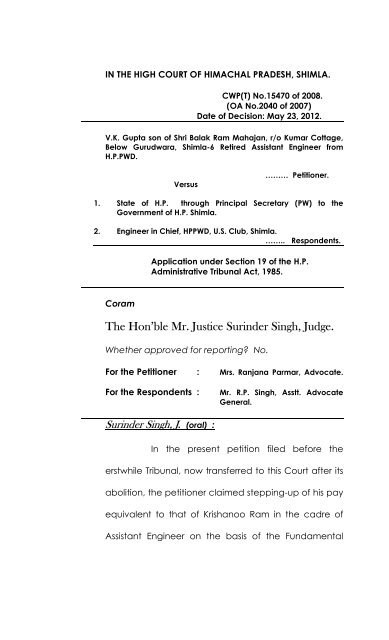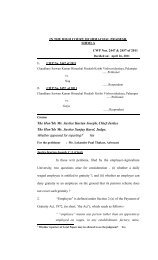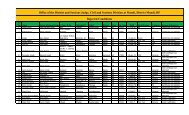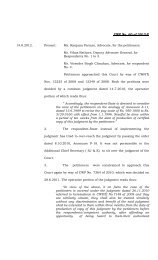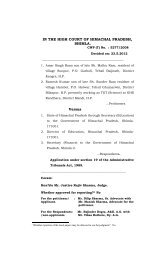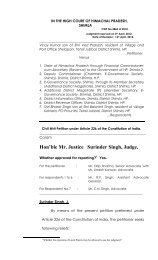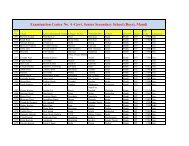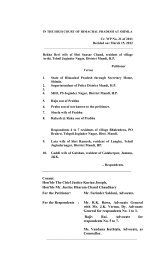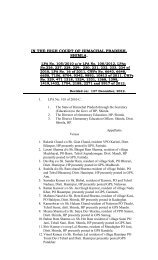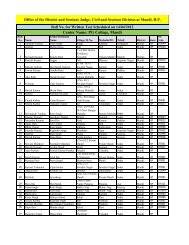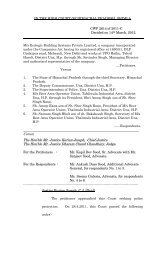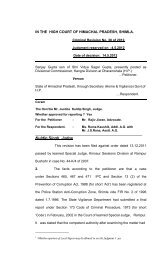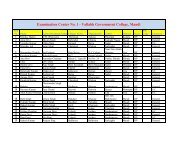The Hon'ble Mr. Justice Surinder Singh, Judge. - High Court of ...
The Hon'ble Mr. Justice Surinder Singh, Judge. - High Court of ...
The Hon'ble Mr. Justice Surinder Singh, Judge. - High Court of ...
You also want an ePaper? Increase the reach of your titles
YUMPU automatically turns print PDFs into web optimized ePapers that Google loves.
- 3 -3. <strong>The</strong> stand <strong>of</strong> the respondent-State is that thecase <strong>of</strong> the petitioner is not covered under thefundamental rules or any <strong>of</strong> the instructions issued bythe State Government, however, it is stated by therespondents that as per instructions <strong>of</strong> the FinanceDepartment issued vide letter No. Fin-C-A(3)-8/88dated 7.3.1991 and as amended from time to time,stepping up <strong>of</strong> senior employee equal to his junior ispermissible only if the following conditionsprescribed therein are fully satisfied. Clause 2 <strong>of</strong> theinstructions reads as follows:-“2. <strong>The</strong> matter relating to removal <strong>of</strong> anomalies insuch cases where pay <strong>of</strong> junior has become morethan his senior after 1/1/1996 as a result <strong>of</strong>application <strong>of</strong> the provisions <strong>of</strong> F.R. 22, wasreceiving the attention <strong>of</strong> the Government and afterdue consideration / examination, and in partialmodification <strong>of</strong> this Department’s OfficeMemorandum No. Fin( C)A(3)-8/88 dated 7.3.1991,it has been decided that the pay <strong>of</strong> seniorGovernment servant be stepped up equal to thepay <strong>of</strong> his junior subject to the following conditions:-(a)(b)both the junior and the senior Governmentservants should belong to the same cadreand the posts in which they have beenpromoted should be identical in the samecadre.<strong>The</strong> pre-revised scale and revised scales <strong>of</strong>pay <strong>of</strong> the lower and the higher posts in
- 4 -which they are entitled to draw pay shouldbe identical.(c) <strong>The</strong> senior Government servant at the time <strong>of</strong>promotion have been drawing equal or morepay than the junior.(d) <strong>The</strong> anomaly should be directly as a result <strong>of</strong>the application <strong>of</strong> the provisions <strong>of</strong>Fundamental Rule-22 or any other rule ororder regulating pay fixation on suchpromotion in the revised scale. If in the lowerpost, the junior was drawing more pay in thepre-revised scale than the senior by virtue <strong>of</strong>any advance increments granted to him,provision <strong>of</strong> these instructions shall not beinvoked to step up the pay <strong>of</strong> the senior<strong>of</strong>ficer.xxx… xxx.. xxx…xxx… xxx… xxx…”4. <strong>The</strong> said instructions also speak to thestepping up <strong>of</strong> pay shall however not be allowed infollowing type <strong>of</strong> cases vide Clasue 6:-(a) Where a senior proceeds on ExtraordinaryLeave which results in postponement <strong>of</strong> date <strong>of</strong>next increment in the lower post, consequentlyhe starts drawing less pay than his junior in thelower grade itself. He, therefore, cannot claimpay parity on promotion even though he maybe promoted earlier to the higher grade;(b) If a senior forgoes/refuses promotionleading to his junior being promoted/appointedto the higher post earlier, junior draws higherpay than the senior. <strong>The</strong> senior may be ondeputation while junior avails <strong>of</strong> the adhoc
- 5 -promotion in the cadre. <strong>The</strong> increased paydrawn by a junior either due to adhoc<strong>of</strong>ficiating/regular service rendered in thehigher posts for period earlier than the senior,cannot, therefore, be an anomaly in strict sense<strong>of</strong> the term;(c) If a senior joins the higher post later than thejunior, for whatsoever reasons, whereby hedraws less pay than the junior, in such casessenior cannot claim stepping up <strong>of</strong> pay or parwith the junior;(d) If a senior is appointed later than the juniorin the lower post itself whereby he is in receipt<strong>of</strong> lesser pay than the junior, in such cases alsothe senior cannot claim pay parity in the higherpost though he may have been promotedearlier to the higher post;(e) Where a person is promoted from lower to ahigher post, his pay is fixed with reference tothe pay drawn by him in the lower post underthe FR 22 and he is likely to get more pay than adirect appointee whose pay is fixed underdifferent set <strong>of</strong> rules. In such cases, the seniordirect recruit cannot claim pay parity with thejunior promoted from a lower post to higher postas seniority alone is not a criteria for allowingstepping up;(f) Where a junior gets more pay due toadditional increments earned on acquiringhigher qualifications, etc.”5. Under clause 2 <strong>of</strong> the aforesaid instructionsa senior is entitled to stepping up <strong>of</strong> his pay so
- 6 -that it is equivalent to that <strong>of</strong> junior where boththe junior and senior belong to the same cadreand the post to which they have been promotedare identical and in the same cadre. <strong>The</strong>re is nodispute that this condition is fulfilled.6. <strong>The</strong> next condition which is required to besatisfied is that the pre-revised and revised scales<strong>of</strong> the lower and higher posts should be identical.<strong>The</strong>re is no dispute with regard to this conditionalso. As per sub clause(c) <strong>of</strong> clause 2 the seniorGovernment servants at the time <strong>of</strong> promotionshould have been drawing equal or more paythan the junior, but this condition is not fulfilled inthe present case, because Krishanoo Ram wasdrawing more pay than the petitioner. Sub clause(d) <strong>of</strong> clause 2 only applies to the junior <strong>of</strong>ficerwas drawing more pay in the pre revised scalethan the senior by virtue <strong>of</strong> any advanceincrement granted to him. This condition is notapplicable here since Krishanoo Ram was notgiven any advance increment but was promotedas an Assistant Engineer earlier to the petitioner
- 7 -on adhoc basis since he was a member <strong>of</strong> thereserved category.7. Clause 6 <strong>of</strong> the aforesaid instructions dealswith those cases where benefits <strong>of</strong> stepping up <strong>of</strong>pay under F.R. 22 are not to be allowed. None <strong>of</strong>the conditions mentioned in clause (a) to (f) areapplicable in the present case, whereas, FR22(I)(a)(1) reads as follows:-(18) Removal <strong>of</strong> anomaly by stepping up <strong>of</strong> pay<strong>of</strong> Senior on promotion drawing less pay thanhis junior.-(a) As a result <strong>of</strong> application <strong>of</strong> FR 22-C (Now FR 22(I)(a)(1).-In order to remove the anomaly <strong>of</strong> aGovernment servant promoted or appointed toa higher post on or after 1.4.1961 drawing alower rate <strong>of</strong> pay in that post than anotherGovernment servant junior to him in the lowergrade and promoted or appointedsubsequently to another identical post, it hasbeen decided that in such cases the pay <strong>of</strong> thesenior <strong>of</strong>ficer in the higher post should bestepped up to a figure equal to the pay as fixedfor the junior <strong>of</strong>ficer in that higher post. <strong>The</strong>stepping up should be done with effect from thedate <strong>of</strong> promotion or appointment <strong>of</strong> the junior<strong>of</strong>ficer and will be subject to the followingconditions, namely;-(a) Both the junior and senior <strong>of</strong>ficersshould belong to the same cadre and the
- 8 -posts in which they have been promotedor appointed should be identical and inthe same cadre;(b) <strong>The</strong> scales <strong>of</strong> pay <strong>of</strong> the lower andhigher posts in which they are entitled todraw pay should be identical;(c) <strong>The</strong> anomaly should be directly as aresult <strong>of</strong> the application <strong>of</strong> FR22-C. Forexample, if even in the lower post thejunior <strong>of</strong>ficer draws from time to time ahigher rate <strong>of</strong> pay than the senior byvirtue <strong>of</strong> grant <strong>of</strong> advance increments, theabove provisions will not be invoked tostep up the pay <strong>of</strong> the senior <strong>of</strong>ficer.<strong>The</strong> orders refixing the pay <strong>of</strong> thesenior <strong>of</strong>ficers in accordance with theabove provisions shall be issued underFR27. <strong>The</strong> next increment <strong>of</strong> the senior<strong>of</strong>ficer will be drawn on completion <strong>of</strong> therequisite qualifying service with effectfrom the date <strong>of</strong> refixation <strong>of</strong> pay.8. <strong>The</strong> aforesaid fundamental rules deals withfixation <strong>of</strong> the salary <strong>of</strong> an employee on hispromotion to a higher post. Instruction issued bythe Government <strong>of</strong> India, Ministry <strong>of</strong> Finance on4th February, 1966 provides that in order toremove the anomaly <strong>of</strong> a Government servantpromoted/ appointed to a higher post butdrawing a lower rate <strong>of</strong> pay in the post than a
- 9 -Government servant junior to him and promotedor appointed subsequently to another identicalpost, such <strong>of</strong>ficer would be entitled to steppingup <strong>of</strong> his pay to make it equal to the pay <strong>of</strong> thejunior. This instruction aforesaid clearly envisagesthat when two persons are in the same gradedoing identical work then the senior cannot getpay less than the senior cannot get pay less thanthat <strong>of</strong> his junior except in the circumstancesspecifically mentioned in the order, such as,having higher qualifications, etc.9. Thus, for the aforesaid reasons, the claim <strong>of</strong>the petitioner is justified also in view <strong>of</strong> thejudgment passed by this <strong>Court</strong> in J.K. Mahindruvs. State <strong>of</strong> H.P.and another [CWP (T) No.13348 <strong>of</strong>2008], decided on 30.12.2010 which has decidedthe identical issue in favour <strong>of</strong> the petitioner. As aresult <strong>of</strong> the aforesaid discussion, the petitioner isheld entitled to having his pay stepped up toequal the pay <strong>of</strong> his junior Shri Krishanoo Ram.10 <strong>The</strong> petition stands accordingly allowed inthe aforesaid terms. <strong>The</strong> respondents are directedto step up the pay <strong>of</strong> the petitioner and make it
- 10 -equal to his junior Krishanoo Ram with allconsequential benefits within two months fromthe receipt <strong>of</strong> the copy <strong>of</strong> this judgment. In case,this due and admissible amount is not paid to thepetitioner within the stipulated period, by therespondents-State, it shall carry an interest @12%interest per annum from the date when theamount fell due to the petitioner.11. <strong>The</strong> petition stands disposed <strong>of</strong> accordingly,so also the pending application(s), if any.May 23, 2012.(Pds)(<strong>Surinder</strong> <strong>Singh</strong>)<strong>Judge</strong>


